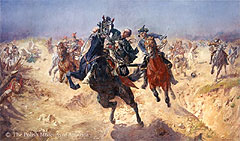Luther Burbank developed more than 800 strains and varieties of plants including fruits, flowers, grains, grasses, and vegetables. Among his creations are 113 varieties of plums, 16 varieties of blackberries, 10 varieties of strawberries, 8 varieties of peaches and many more. He developed a spineless cactus for cattle-feed and the plumcot. He was known as a kind, generous man who lived a simple life and whose greatest passion was a better life for his fellow man.
Arbor Day is celebrated nationally to encourage Americans to maintain and replenish our country’s vast forests, orchards, and woodlands. In California, we also observe Arbor Day starting on the birthday of Luther Burbank (March 7, 1849 to April 11, 1926), a famed California horticulturalist whose life’s labor produced hundreds of plants and trees that have contributed to the natural splendor and food production in our state. The week of March 7 to March 14 of each year is celebrated as California Arbor Week.
Trees are a vital resource in beautifying our urban environment and serve as an important psychological link with nature for California’s urban residents and underserved communities. They are a valuable economic asset in our cities that help maintain or increase property values and attract business and new residents in urban areas. Trees play an important role in energy conservation by modifying temperature extremes with shade and humidity, and are particularly important in reducing the amount of energy consumed in heating and cooling buildings and homes.
Trees planted in urban areas also play a significant role in meeting the state’s greenhouse gas emission reduction targets by sequestering carbon as well as reducing energy consumption. Trees directly contribute to improving California’s air quality by reducing air pollution, removing airborne particulates from the atmosphere, and helping to purify the air. They play a significant role in protecting and purifying California’s limited water resources by reducing surface runoff, contributing to storm water management activity, and protecting urban water resources.
Trees provide essential habitat for much of California’s wildlife, including many listed, threatened, and endangered species. Trees also enhance the aesthetic quality of life in urban communities by providing a natural buffer for surface noise and a natural recreational resource for California’s children and at-risk youth.
California has more urban and community forestry organizations than any other state simply because trees, green spaces, and the canopy cover are so important to our children, our residents, and visitors to our state.
Maximizing the benefits of trees through multiple-objective projects that contribute to public infrastructure services can provide cost-effective solutions to the needs of underserved and severely underserved communities, as well as urban and suburban areas, by harnessing the aforementioned benefits provided by trees.
Luther Burbank was the thirteenth of eighteen children and was born on a farm in Lancaster, Massachusetts. In 1930 the U.S. Congress was inspired by his work to pass the Plant Patent Act and Burbank was awarded 16 plant patents posthumously. His farm is now a national historic landmark and in 1986 he was inducted into the National Inventors Hall of Fame.
Source: ca.gov




